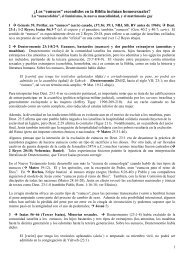Deuteronomy: - Fundación Otras Ovejas de Argentina
Deuteronomy: - Fundación Otras Ovejas de Argentina
Deuteronomy: - Fundación Otras Ovejas de Argentina
Create successful ePaper yourself
Turn your PDF publications into a flip-book with our unique Google optimized e-Paper software.
an indication that angels are spiritual in the sense that they are non-material beings and, consequently, incapable of<br />
coitus with anyone. However, other texts make clear the sexual capacity of angels (� Gen. 6:1-4, 18-19, Ju<strong>de</strong> 7<br />
and 1 Cor. 11:10). The Levirate law also offers consi<strong>de</strong>rable difficulty to those who see an absolute ethic against<br />
polygamy (by chance do three become one?) and homosexual relationships in the language of ―two shall become<br />
one.‖ While it does not represent the i<strong>de</strong>al, for certain situations where the alternatives are worse a type of ―open<br />
marriage‖ was not only permitted but actually ordained by God.<br />
The law and practice of Levirate marriage, never abandoned in the New Testament, present serious problems for<br />
i<strong>de</strong>ological fundamentalism. Fundamentalists who <strong>de</strong>mand a simple ―return to the Bible‖ for mo<strong>de</strong>rn sexual<br />
questions must explain why in churches today no hands are cut off (Deut. 25:11-12), no one takes an oath in court<br />
with their hand on male genitals (instead of the Bible; see Gen. 24:1-4), neither are men with <strong>de</strong>ceased brothers<br />
obligated to fulfill the responsibility of Levirate marriage, comman<strong>de</strong>d in the Bible and never revoked.<br />
3.8 Bestiality, males, 27:21 (see � Ex. 22:18; + women, Lev. 18:23, 20:15-16).<br />
*3.9-11 Eunuchs, bastards (mamzer) and two foreign peoples (Gentiles), 23:1-8. <strong>Deuteronomy</strong> exclu<strong>de</strong>s<br />
from the Israelite community: (1) eunuchs, (2) illegitimate children and (3) two types of foreigners (the Ammonites<br />
and the Moabites) to the tenth generation; however Edomites and the Egyptians could be inclu<strong>de</strong>d from the third<br />
generation. The link between prejudices against sexual minorities and foreigners (xenophobia, homophobia, etc.)<br />
is common in the Bible, as in all of history and human literature. Concerning eunuchs, <strong>Deuteronomy</strong> says:<br />
No one whose testicles are crushed (daka´) or whose penis is cut off shall be admitted to the assembly<br />
(qahal) of Yahweh (23:1).<br />
Yet, surprisingly, we read in Third Isaiah (� Isaiah 56-66) an oracle that revokes two of the Torah provisions:<br />
3 Do not let the foreigner joined to the Lord say,<br />
―The Lord will surely separate me from his people‖;<br />
And do not let the eunuch say,<br />
―I am just a dry tree.‖<br />
4 For thus says the Lord:<br />
To the eunuchs who keep my sabbaths,<br />
who choose the things that please me<br />
and hold fast my covenant,<br />
5 I will give, in my house and within my walls,<br />
a monument and a name<br />
better than sons and daughters;<br />
I will give them an everlasting name<br />
that shall not be cut off (karath; see eunuch, one castrated)….<br />
7 these I will bring to my holy mountain,<br />
and make them joyful in my house of prayer;<br />
their burnt offerings and their sacrifices<br />
will be accepted on my altar;<br />
for my house shall be called a house of prayer<br />
for all peoples. (Is. 56:3-5, 7; � Rom. 15:1-6)<br />
To interpret Deut. 23:1-8 correctly in its patriarchal context, we should note that it <strong>de</strong>als with the qualifications for<br />
entering/participating in the assembly (political-religious-military-judicial), ma<strong>de</strong> up of Israelite adult males and<br />
generally excluding the women. 53 Thus, a castrated male was not consi<strong>de</strong>red a complete man, but reduced to the<br />
inferior status of a woman. Furthermore, the diversity in biblical traditions is evi<strong>de</strong>nt even in the motive for<br />
excluding the Moabites, since Deut. 23:5 <strong>de</strong>clares that this ethnic group had <strong>de</strong>nied the Israelites solidarity in<br />
18

















